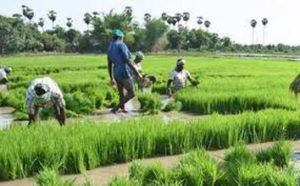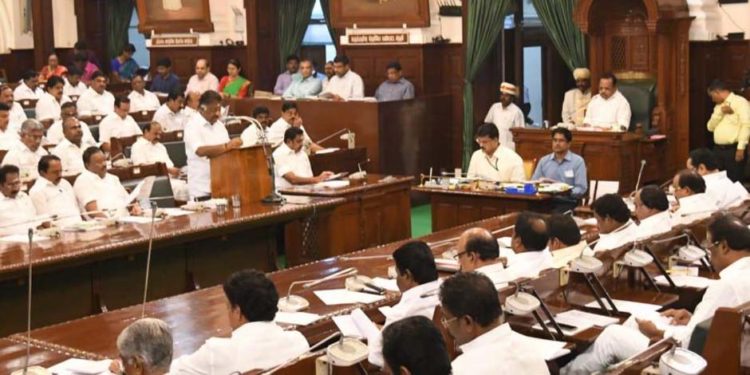CHENNAI, FEB 14
The AIADMK government in Tamil Nadu on Friday presented a populist budget, the last full-fledged exercise in its present regime ahead of the Assembly elections next year with a Rs 59,346 crore fiscal deficit and is set to borrow Rs 59,209 crore.

The outstanding debt will be Rs 4,56,660.99 crore constituting 21.83 per cent of GSDP in 2020-21 which is within the norms of Tamil Nadu Fiscal Responsibility Act.
The Chief Minister K Palaniswami-led government, which has been implementing a slew of welfare schemes announced a Special Purpose Vehicle (SPV) to finance and manage the popular state-run, low-cost food chain ”Amma Unavagam” and made a provision of Rs 100 crore for the purpose.
The government which provides free rice for ration card holders provided Rs 6,500 crore for food subsidy.
Supply of toor dal and edible oil at subsidised rates will be continued in 2020-21 as well.
With Rs. 11,894 cr allocation, for agriculture gets a thrust

While agriculture saw an allocation of Rs 11,894.48 crore, fisheries got Rs 1,229.85 crore. As many as 7.41 lakh acres will be covered under micro irrigation with an enhanced outlay of Rs 1,844.97 crore.
A total crop loan of Rs 11,000 crore will be disbursed by cooperative institutions and a provision of Rs 200 crore has been made to provide full interest waiver for prompt repayment of loans.
Deputy Chief Minister O Panneerselvam, who holds the finance portfolio presented the budget and this is the 10th time he is tabling the annual financial statement.
His budget address stretched to about three hours and 15 minutes and is seen as among the lengthiest in Tamil Nadu.
The budget speech was peppered with references to late Chief Minister J Jayalalithaa’s name and her initiatives and Leader of Opposition M K Stalin sat through the address.
“Despite the many fiscal constraints, Tamil Nadu remains steadfast in adhering to fiscal discipline and has maintained key fiscal ratios including the fiscal deficit and the debt to GSDP ratio within the prescribed norms,” he said.
On flagship welfare initiatives like free distribution of milch cows, goats, and sheep, the Minister said in 2018-19 the livestock sector accounted for 5.83 per cent of the State Gross Value-Added and the fisheries sector for a further 0.47 per cent.
In 2016-17, the livestock sector surpassed the share of the agriculture sector in Gross State Value Added at constant prices and has maintained the position in 2017-18 and 2018-19.
“This reflects the success of the flagship initiatives launched by late Chief Minister Puratchi Thalaivi J Jayalalithaa for the free distribution of milch animals… and the fodder development programme.
This also demonstrates that growing incomes are causing changes in food preferences to protein-rich foods like milk, milk products eggs, and meat.”
The government allocated Rs 4,315.21 crore for social security pension covering 1.73 lakh new beneficiaries and Rs 250 crore for the accident-cum-life insurance scheme for Below Poverty Line families.
To finance the fiscal deficit, the government plans to raise Rs 59,209.30 crore as a net debt against the overall permissible borrowing limit of Rs 62,757.80 crore, Panneerselvam said in his budget address.
While the revenue deficit stood at Rs 21,617.64 crore, the revenue expenditure has been projected at Rs 2,40,992.78 crore.
Significantly, the government set apart Rs 4,265.56 crore to help State-run electricity generation and distribution behemoth TANGEDCO overcome losses and allocated Rs 20,115.58 crore for the energy sector.
“The government is committed to funding 50 per cent of the losses incurred by TANGEDCO in the previous year and the budget estimates 2020-21, Rs 4,265.56 crore has been provided for this purpose,” the Minister said.
Noting that Tamil Nadu has “withstood fierce economic headwinds” seen at the global and national level, he said in 2019-20 growth is projected to be 7.27 per cent, higher than the projected all India growth rate of 5 per cent.
The State’s economy grew at 8.17 per cent in 2018-19 and at the national level, the growth estimates for 2019-20 were revised downwards at 5 per cent.
TN Govt to join hands with WB to develop Chennai
As far as the city is concerned, Panneerselvam said the government will launch the Chennai City partnership programme as a unique model of development co-operation with the World Bank to ensure the continued sustainable growth of metropolitan Chennai. ”This project comprises three major pillars – urban mobility, water resilience, and urban governance and finance,” he said.
He also said that a sum of Rs 3,100 crore has been allocated for the Chennai Metro Rail Project as share capital assistance, subordinate debt and pass-through loan assistance.
POWER PLAY
He added that 5,692 existing distribution transformers in Chennai and its suburbs are being replaced by 11 kV Ring Main Units at a cost of about Rs 785 crore.
”The Ponneri Industrial Node of the Chennai-Bengaluru Industrial Corridor (CBIC) will be developed on an area of 21.966 acres in Thriuvallur district. To promote innovation at the grass-root level SIPCOT will establish Industrial Innovation Centres at Sriperumbudur and Hosur, with support under the Tamilnadu Innovation Initiatives, at a total cost of Rs 53.44 crore,” Panneerselvam said.
INFRA INPUT
He added that Rs 263 crore has been allocated for Phase II and Phase III of Chennai Outer Ring Road. Panneerselvam said that the process of identifying land for construction of Master Plan Complexes in the five newly formed districts has commenced and these complexes would be constructed at a total cost of Rs 550 crore.
Highlights
* Rs 300 crore allocated for Kudimaramathu works
* Rs 6,991 crore allocated for irrigation projects
* 20,000 new houses to be built under PM and CM housing schemes.
* Rejuvenation of old Amma canteens and opening of new ones at a cost of Rs 100 crore.
* Stamp duty tax reduced to 0.25 per cent from 1 per cent.
* Compensation for deaths due to accidents and other causes increased to Rs 4 lakh










